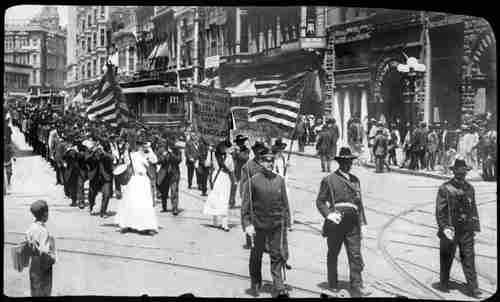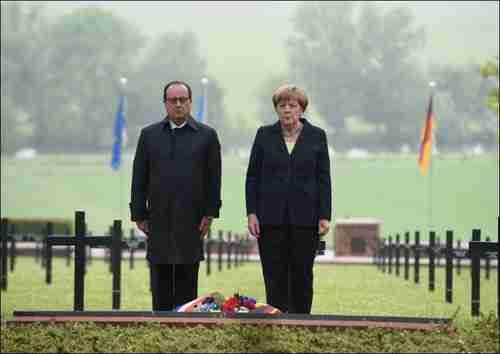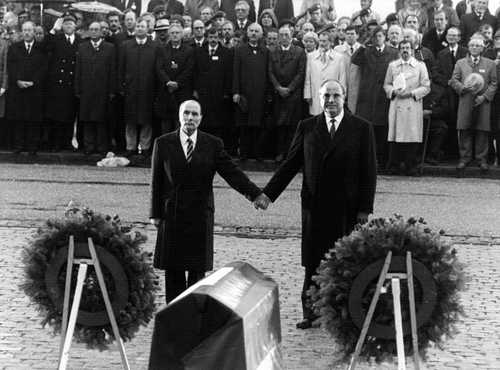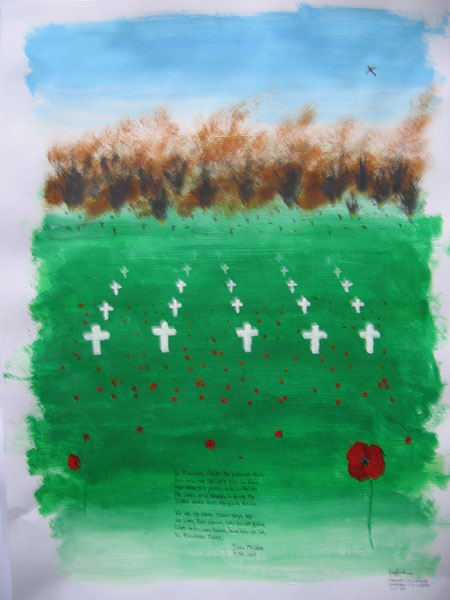
Dynamics

|
Generational Dynamics |
| Forecasting America's Destiny ... and the World's | |
| HOME WEB LOG COUNTRY WIKI COMMENT FORUM DOWNLOADS ABOUT | |
Pacifism and the futility of war
This morning's key headlines from GenerationalDynamics.com
 |
Decoration Day was officially designated on May 5th, 1868, by President Ulysses Grant, to honor and decorate with flowers the graves of fallen soldiers during the Civil War. It was officially proclaimed on by General John Logan, national commander of the Grand Army of the Republic, in his General Order No. 11:
"The 30th of May, 1868, is designated for the purpose of strewing with flowers, or otherwise decorating the graves of comrades who died in defense of their country during the late rebellion, and whose bodies now lie in almost every city, village and hamlet churchyard in the land."
The date of Decoration Day, as he called it, was chosen because it wasn’t the anniversary of any particular battle.
Following World War I, Decoration Day was changed to Memorial Day, to honor Americans who died fighting in any war, not just the Civil War. Memorial Day is different from Veterans Day, which honors living veterans.
In 1971, Congress passed the National Holiday Act of 1971, making Memorial Day the last Monday in May, and a federal holiday, ensuring a three-day weekend. Almost every state now observes the holiday, although some southern states have an additional separate day for honoring the Confederate war dead: January 19th in Texas; April 26th in Alabama, Florida, Georgia, and Mississippi; May 10th in South Carolina; and June 3rd (Jefferson Davis’ birthday) in Louisiana and Tennessee. Washington Post and US Memorial Day and LA Times
 |
Verdun was the longest battle of World War I, a savage confrontation lasting 10 months and leaving 800,000 German and French soldiers dead, wounded or missing. The Germans fired two million shells in the opening eight-hour bombardment, and tens of millions were fired over the course of the conflict.
The Germans initially gained five miles of ground in the battle, but over time the French regained the ground they had lost. Officially, France was the victor, but they had nothing to show for their victory but piles of dead bodies.
On Sunday, German chancellor Angela Merkel and France's president François Hollande led a ceremony in the city of Verdun, to commemorate the battle's 100th anniversary.
Both Merkel and Hollande related the battle to today's migrant and Brexit crises, which are threatening to tear the European Union apart. Merkel said:
"The name Verdun stands for incomprehensible cruelty and the futility of war as well as the lessons learnt and the German-French reconciliation. ...War is possible. We must remain vigilant to avoid it ... All these dead are the victims of nationalism, of stubborn blindness and the failings of politicians."
Hollande warned against "forces of division" in Europe, saying "Disenchantment has given way to bitterness, doubt to suspicion and, for some, rejection or even separation."
The ceremony was held at Douaumont Ossuary, which contains the bones of 130,000 German and French soldiers. BBC and Irish Times
 |
Although reconciliation between Germany and France was every European leader's goal after World War II, the bitter war kept them separated. By 1984, the people in the generations of Nazi and French leaders who had fought the war were finally mostly gone, and reconciliation was finally possible.
Above is the highly emotional photo of Helmut Kohl and François Mitterrand standing hand-in-hand during a 1984 commemoration ceremony at Verdun. It's an iconic photo illustrating reconciliation that took place between their respective nations after two world wars.
This was the 68th anniversary of the Battle of Verdun. Kohl and Mitterrand issued a joint statement:
"France and Germany have learnt lessons from our history. Europe is our common fatherland. We are heirs of a grand European tradition. This is why, forty years ago, we ended our fratricidal war and began to build our future together. We were reconciled, we came to an agreement, we became friends. European unification is our common goal – this is what we are working towards – in the spirit of fraternity."
Today in History and International Herald Tribune (29-May-1966)
 |
Many people wear red poppies on Memorial Day, to commemorate the dead. The tradition came about because of the following poem, written by a Canadian soldier fighting in World War I:
In Flanders Fields
By: Lieutenant Colonel John McCrae, MD (1872-1918)
Canadian Army
IN FLANDERS FIELDS the poppies blow
Between the crosses row on row,
That mark our place; and in the sky
The larks, still bravely singing, fly
Scarce heard amid the guns below.
We are the Dead. Short days ago
We lived, felt dawn, saw sunset glow,
Loved and were loved, and now we lie
In Flanders fields.
Take up our quarrel with the foe:
To you from failing hands we throw
The torch; be yours to hold it high.
If ye break faith with us who die
We shall not sleep, though poppies grow
In Flanders fields.
Lieutenant Colonel John McCrae died of pneumonia and meningitis in Boulogne, France, on January 28th, 1918. The poppy is Canada's official Flower of Remembrance. LaMa Arts and Flanders Fields Music
At Sunday's commemoration of the Battle of Verdun, German Chancellor Angela Merkel said, "The name Verdun stands for incomprehensible cruelty and the futility of war."
If any battle illustrates the futility of war, then the Battle of Verdun does. The German attack won five miles of ground which the French recovered in the weeks that followed. What was the point?
In fact, you could ask the same thing about all of World War I and World War II. There have been some small boundary changes in Europe in the last century, but hardly worth hundreds of millions of people killed.
If the futility of war is so obvious, then why are there wars? Why isn't everyone a pacifist?
From the point of view of Generational Dynamics, the answer is simple: The world's population grows faster than the world's food supply. That means that, eventually, some people will have to be exterminated so that there'll be food for the rest. The same reasoning applies to other resources.
A good example is the Mideast. The Israelis and the Palestinians have some of the fastest growing populations in the world. Each year, more and more people are jam-packed into Israel, Gaza and the West Bank. And the Israelis and Palestinians hate each other. (Incidentally, the Palestinians in Gaza and the West Bank hate each other also, to a lesser extent.) All these Israeli and Palestinian children are simply cannon fodder for the next war. People who talk about "two nations, Israel and Palestine, living side by side in peace and harmony" are living in a total fantasy. This region is like a pressure cooker that must some day explode.
If you believe in evolution, then this is easily explainable. The strongest and fastest growing species is the one most likely to survive, because it will get the most food and resources. If there's no food left for the weaker species, then that species will quietly become extinct. That's because animals are not intelligent. Humans are intelligent, so they don't quietly become extinct. They conduct riots, demonstrations, and terrorist attacks, and eventually wars of extermination. So the strongest and fastest growing tribes, societies or nations will win the wars, and get all the food
If you believe in creationism, then the explanation is different, but also easily explainable. God has created a world in which the population grows faster than the food supply, so wars of extermination must occur. If wars of extermination must occur, because of God's creation, then it's God's fault that wars of extermination occur. It hardly makes sense to blame humans for wars of extermination if God has created a world in which wars of extermination are required. So the strongest and fastest growing tribes, societies or nations will win the wars, and get all the food.
So was the Battle of Verdun an example of futility? No, absolutely not. The Battle of Verdun killed off 800,000 people, and the food for those 800,000 people became available to other people. With those 800,000 people dead, they didn't need food, didn't need water, didn't need land, didn't need energy, and so forth. Those resources became available to other people. So the Battle of Verdun did exactly what it had to do, and except for those who experienced personal loss, it improved the lives of millions of other people. And that, Dear Reader, is the way the world works.
The world is bulging with people. Food is becoming more expensive, and refugees are pouring out of Asia, the Mideast and Africa. These are typical characteristics of a generational Crisis era.
Here are five events:
Sooner or later, one of these events (or something like them) will occur, and in this generational Crisis era, that will trigger all the others, and the Clash of Civilizations world war.
(Comments: For reader comments, questions and discussion, see the 30-May-16 World View -- Decoration Day: Commemorating America's heroes and the Battle of Verdun thread of the Generational Dynamics forum. Comments may be
posted anonymously.)
(30-May-2016)
Permanent Link
Receive daily World View columns by e-mail
Donate to Generational Dynamics via PayPal
Web Log Summary - 2016
Web Log Summary - 2015
Web Log Summary - 2014
Web Log Summary - 2013
Web Log Summary - 2012
Web Log Summary - 2011
Web Log Summary - 2010
Web Log Summary - 2009
Web Log Summary - 2008
Web Log Summary - 2007
Web Log Summary - 2006
Web Log Summary - 2005
Web Log Summary - 2004
Web Log - December, 2016
Web Log - November, 2016
Web Log - October, 2016
Web Log - September, 2016
Web Log - August, 2016
Web Log - July, 2016
Web Log - June, 2016
Web Log - May, 2016
Web Log - April, 2016
Web Log - March, 2016
Web Log - February, 2016
Web Log - January, 2016
Web Log - December, 2015
Web Log - November, 2015
Web Log - October, 2015
Web Log - September, 2015
Web Log - August, 2015
Web Log - July, 2015
Web Log - June, 2015
Web Log - May, 2015
Web Log - April, 2015
Web Log - March, 2015
Web Log - February, 2015
Web Log - January, 2015
Web Log - December, 2014
Web Log - November, 2014
Web Log - October, 2014
Web Log - September, 2014
Web Log - August, 2014
Web Log - July, 2014
Web Log - June, 2014
Web Log - May, 2014
Web Log - April, 2014
Web Log - March, 2014
Web Log - February, 2014
Web Log - January, 2014
Web Log - December, 2013
Web Log - November, 2013
Web Log - October, 2013
Web Log - September, 2013
Web Log - August, 2013
Web Log - July, 2013
Web Log - June, 2013
Web Log - May, 2013
Web Log - April, 2013
Web Log - March, 2013
Web Log - February, 2013
Web Log - January, 2013
Web Log - December, 2012
Web Log - November, 2012
Web Log - October, 2012
Web Log - September, 2012
Web Log - August, 2012
Web Log - July, 2012
Web Log - June, 2012
Web Log - May, 2012
Web Log - April, 2012
Web Log - March, 2012
Web Log - February, 2012
Web Log - January, 2012
Web Log - December, 2011
Web Log - November, 2011
Web Log - October, 2011
Web Log - September, 2011
Web Log - August, 2011
Web Log - July, 2011
Web Log - June, 2011
Web Log - May, 2011
Web Log - April, 2011
Web Log - March, 2011
Web Log - February, 2011
Web Log - January, 2011
Web Log - December, 2010
Web Log - November, 2010
Web Log - October, 2010
Web Log - September, 2010
Web Log - August, 2010
Web Log - July, 2010
Web Log - June, 2010
Web Log - May, 2010
Web Log - April, 2010
Web Log - March, 2010
Web Log - February, 2010
Web Log - January, 2010
Web Log - December, 2009
Web Log - November, 2009
Web Log - October, 2009
Web Log - September, 2009
Web Log - August, 2009
Web Log - July, 2009
Web Log - June, 2009
Web Log - May, 2009
Web Log - April, 2009
Web Log - March, 2009
Web Log - February, 2009
Web Log - January, 2009
Web Log - December, 2008
Web Log - November, 2008
Web Log - October, 2008
Web Log - September, 2008
Web Log - August, 2008
Web Log - July, 2008
Web Log - June, 2008
Web Log - May, 2008
Web Log - April, 2008
Web Log - March, 2008
Web Log - February, 2008
Web Log - January, 2008
Web Log - December, 2007
Web Log - November, 2007
Web Log - October, 2007
Web Log - September, 2007
Web Log - August, 2007
Web Log - July, 2007
Web Log - June, 2007
Web Log - May, 2007
Web Log - April, 2007
Web Log - March, 2007
Web Log - February, 2007
Web Log - January, 2007
Web Log - December, 2006
Web Log - November, 2006
Web Log - October, 2006
Web Log - September, 2006
Web Log - August, 2006
Web Log - July, 2006
Web Log - June, 2006
Web Log - May, 2006
Web Log - April, 2006
Web Log - March, 2006
Web Log - February, 2006
Web Log - January, 2006
Web Log - December, 2005
Web Log - November, 2005
Web Log - October, 2005
Web Log - September, 2005
Web Log - August, 2005
Web Log - July, 2005
Web Log - June, 2005
Web Log - May, 2005
Web Log - April, 2005
Web Log - March, 2005
Web Log - February, 2005
Web Log - January, 2005
Web Log - December, 2004
Web Log - November, 2004
Web Log - October, 2004
Web Log - September, 2004
Web Log - August, 2004
Web Log - July, 2004
Web Log - June, 2004